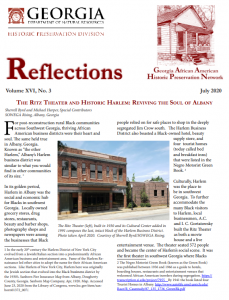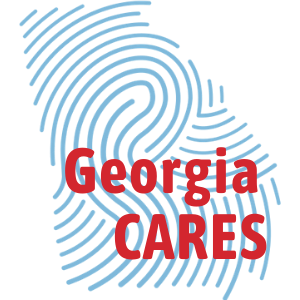Think, Question, and Connect
Every other week, we’ll debut curated digital content on a variety of different topics. Each edition follows a loose theme, and features articles and content from us and our friends and partners.

Rethinking Independence
This year, our country celebrated its 244th Independence Day, recognizing the adoption of the Declaration of Independence on July 4, 1776, by the Second Continental Congress.
Our country’s relationship with independence is far more nuanced than a revered document. How do we reconcile our ideas of independence with the fact that America’s founders knew full well that not all citizens would be free? How do we rectify the fact that many of the Declaration’s signers also enslaved human beings whose descendants are still oppressed by remnants of the system that imprisoned their ancestors in the first place?
How can we celebrate this pivotal day in our nation’s history while also acknowledging that the Declaration’s promises of life, liberty, and the pursuit of happiness have yet to be guaranteed for all of our nation’s citizens?
History is imperfect, and the people who have made history and who construct its narratives are imperfect, too. The humanities help us to take a deep dive into those imperfections, to analyze them, and to view our shared history from a variety of perspectives.
In the last few months, our notions of independence have been challenged. We’ve been asked to put public health above our own personal desires—staying home, wearing masks, keeping our distance—to ensure that those we love and those we have never met don’t get sick. We watched in horror as our fellow Georgian Ahmaud Arbery’s life was viciously ended by men who had no right to take it, who had no right to interfere with Arbery’s right to live. The world was as much his as it is theirs.
Discovering a new perspective can challenge us. And it can foster empathy for our fellow human beings and their experiences.
Also over the last few months, many of us have tried to learn more about one another by seeking out new podcasts, books, films, TV shows, poems, art, and more. In times of crisis we often find ourselves looking to the humanities for explanations, and sometimes, for comfort.
We need to continue to support humanities scholars who research and write, and the education of students in history, literature, poetry, philosophy, journalism, foreign languages, and more. We need to continue to support our cultural institutions whose work elevates the many narratives and experiences of our shared human history. And most important—we must vigilantly examine and question our perceptions about society. Looking to the humanities, which foster education, conversation, and understanding, is a great place to start.
We’re still here—at least six feet apart and with fewer than six degrees of separation—reminding you that although we may be distanced, we aren’t disconnected. Included in this edition of our e-newsletter, we highlight just a few of the many organizations and resources across our state whose humanities work gives us hope for a better future.
—Georgia Humanities
Quick Guide
Discover just a few (of the many!) organizations across the state whose humanities work gives us hope for a better future.
Learn how to interpret a monument, using a toolkit developed by the Atlanta History Center.
Find out how you can help the Georgia Trust #PreserveHope.
Make time for Reflections, courtesy of our friends in the Historic Preservation Division of the Georgia Department of Natural Resources.
Read more about how Georgia Humanities is supporting our state’s humanities community.
Peruse the humanities news you may have missed, from across Georgia and beyond.

As they reopen to the public, we hope you’ll safely visit Georgia’s many cultural institutions dedicated to sharing the diversity of the human experience across our state. We have listed just a few (of the many!) organizations we think you should know about.
Until a time when they are all able to welcome us in person, we hope you’ll visit them online and explore their digital resources.
Lucy Craft Laney Museum of Black History, Augusta
The Lucy Craft Laney Museum of Black History, which opened in 1991, is a small house museum that is the former home of Lucy Craft Laney, one of Georgia’s most influential educational leaders. (You can read more about Lucy Craft Laney in the New Georgia Encyclopedia.) The Museum is located in the Historic Laney-Walker District, near the original site of the Haines Normal and Industrial Institute, of which Laney was the founder and principal for 50 years. The Museum promotes Laney’s legacy through various exhibits and programs.
Did you know?
The “Golden Blocks” in the Laney-Walker District of Augusta were the heart of the city’s Black business community during segregation. In partnership with the Greater Augusta Arts Council, the Museum developed the Golden Blocks Project in 2019, which created new public art displays that connect with the historical and cultural significance of Augusta’s Golden Blocks. (You can take the digital tour here, developed as part of the Digital Tour Initiative, a partnership between Georgia Humanities and the Emory Center for Digital Scholarship.)
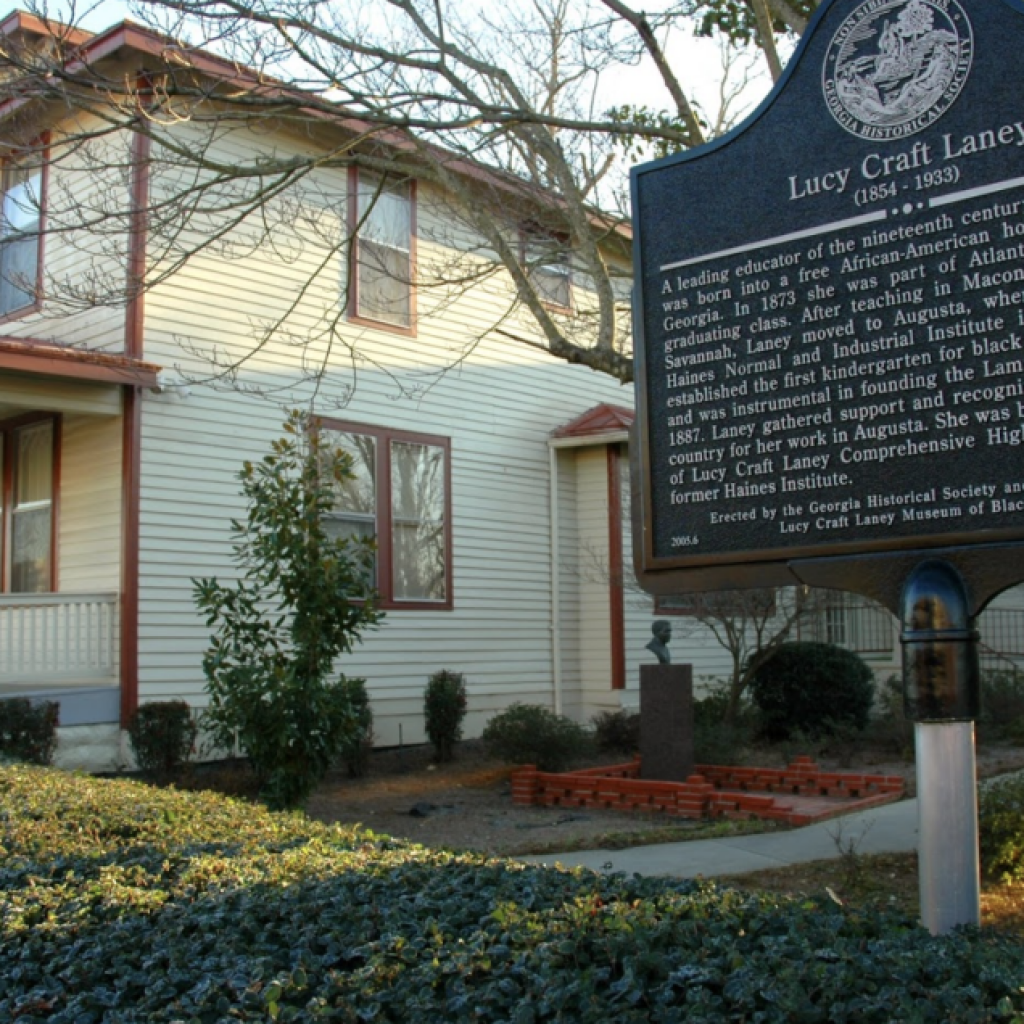
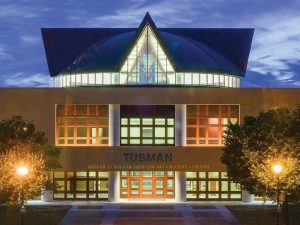
The Tubman Museum, Macon
The Tubman Museum, founded in 1981, is the largest museum in the nation dedicated to educating people about the art, history and culture of African Americans. Its range of exhibits, art, and historical artifacts relate to the broad sweep of African American history and culture. Named for Harriet Tubman, the woman who led hundreds of slaves to freedom, the Tubman Museum has grown over the years to become the largest institution of its type and a key educational and cultural resource in the Southeast. Its exhibits feature a range of topics, from its gallery featuring African American inventors whose inventions are not as widely known, to its prominent mural, which measures 68 inches tall and 55 feet long highlighting the feats of African Americans from past to present.
Chieftains Museum/Major Ridge Home, Rome
The Major Ridge Home, transformed into a museum in 1971, is listed on the National Register of Historic Places and is a National Historic Landmark. In 2002, the Museum announced its participation with the National Park Service as a site on the Trail of Tears National Historic Trail. The Museum serves as a historic site and interpretive museum and presents exhibits, education programs, and events that pertain to the Ridge family and Cherokee history and culture. (You can read more about the Chieftains Museum and Major Ridge himself in the New Georgia Encyclopedia.)
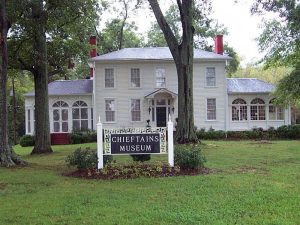
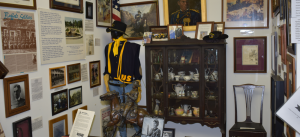
The Jack Hadley Museum of Black History, Thomasville
The Jack Hadley Museum of Black History is Thomasville’s first Black history museum. It was established in 1995 to educate individuals about the history and culture of African Americans locally and nationally. The Museum features historian Jack Hadley’s private collection of artifacts, which has preserved more than 4,600 items. The Museum documents, preserves, and exhibits African American artifacts of historical significance to southwest Georgia.
The Beach Institute, Savannah
The Beach Institute is Savannah’s first school built after Emancipation specifically for African Americans. Today a cultural center, the Beach Institute collects, interprets, preserves, and presents African American history and culture through exhibits and artistic and educational programs.
Did you know?
The Beach Institute was a 2016 recipient of the Governor’s Awards for the Arts and Humanities.
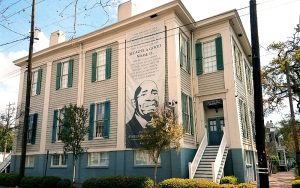

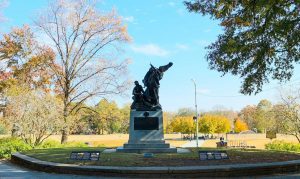
The Atlanta History Center’s Confederate Monument Interpretation Guide
In 2016, the Atlanta History Center published an online toolkit designed to help communities address the Confederate monuments within their surroundings. The toolkit has expanded, and now includes case studies (including the City of Atlanta’s efforts to contextualize the city’s Confederate monuments), a research guide (including the important questions to ask), and other resources to foster community conversations about the best course of action for each individual monument.
The toolkit also includes books, scholarship, and the latest news surrounding Confederate monuments in Georgia and across the country.

#PreservingHope
The Georgia Trust and a network of Georgia nonprofit historic preservation organizations have launched #PreservingHope, a campaign designed to raise awareness of historic buildings and sites that have been places of relief efforts, essential services, and refuge during times of war, pandemics, civil unrest, natural disasters, and other uncertain times in our country’s history.
The sites can be big or small, historically significant or personally meaningful, restored or not, but the site should be at least 50 years old. You can be a part of Preserving Hope by downloading the Georgia Trust toolkit (the Preserving Hope sign is pictured left), snapping a photo of your selected place, and sharing it on social media with the hashtag #PreservingHope.
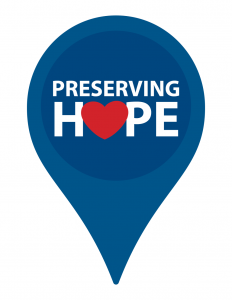

Published by our friends in the Historic Preservation Division of the Georgia Department of Natural Resources, the Reflections newsletter features African American historic resources and stories from across Georgia, from the Hart County Training School in Hart County to the McCoy Hills Historic District in Americus.
We’re proud to point out that our dear friend and board member (and previous board chair!) Jeanne Cyriaque created Reflections in December 2000.
Reflections includes the research of scholars across the state, and continues to be an invaluable resource to sharing Georgia’s important stories.

Georgia Humanities Awards $634,200 in CARES Act Relief Funding
Grants ranging from $5,000 to $15,000 were awarded to 77 museums, libraries, historical societies, colleges and universities, and other organizations that offer humanities programming to Georgians.
Some grants will allow organizations to keep staff employed, others will use funds to protect facilities and collections; some will offer virtual programming; and others will plan and train staff to prepare for facilities to reopen observing public health recommendations for reduced crowd size and social distancing.
Administered by Georgia Humanities, these grants are funded by the National Endowment for the Humanities (NEH) as part of the Coronavirus Aid, Relief, and Economic Security (CARES) Act economic stabilization plan appropriated by the U.S. Congress. Georgia Humanities distributed 100% of the funds entrusted to us by NEH and the U.S. Congress to Georgia organizations.
Georgia Humanities Awards More than $41,000 in Program Grants in Spring Grant Cycle
Georgia Humanities supports the efforts of nonprofit organizations that seek to foster connections between people and ideas. Through a competitive process, we award grants to such cultural, civic, and educational entities as museums, libraries, universities and historical societies for a range of projects including walking tours, exhibitions, and lecture series. In June 2020, the Georgia Humanities Board of Directors announced $41,500 in program grants to 21 organizations from Blairsville to Savannah.
Team Georgia Earns Top Marks at the National History Day National Contest
The virtual National History Day contest was held June 9–14, 2020.
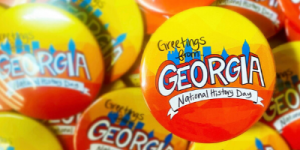
The 2020 National History Day Georgia buttons.
More than 60 Georgia students qualified to compete in the National History Day (NHD) National Contest after earning top marks at the virtual National History Day Georgia State Contest held earlier in April. In both the junior and senior divisions, students competed a range of projects including papers, documentaries, exhibits, and websites, in relation to the theme “Breaking Barriers in History.”
Georgia students competed with peers from all 50 states and U.S. territories and countries as far away as Singapore. For the second year in row, the contest’s Outstanding Entry on Native American History award, sponsored by the National Park Service, was awarded to a Georgia student. The award is given in recognition of demonstrated excellence in the study of Native American history. The 2020 recipient of this award, Sophia Shepherd, is a student at Druid Hills High School.
For the first time in NHD Georgia history, a Georgia student’s documentary was selected to be screened in a virtual showcase sponsored by the Smithsonian Learning Lab. Midtown International School student Temple Lester’s documentary, “Shirley Chisholm: The Good Fight,” was one of just 35 student documentaries selected for this prestigious opportunity by the staff of the Smithsonian National Museum of African American History and Culture.
This year, the student projects representing Georgia at the NHD National Contest are featured in an online showcase developed by the NHD Georgia team. All Team Georgia projects are available to explore, and we can guarantee that virtual visitors to the online showcase will leave learning something new. National History Day Georgia is a program of Georgia Humanities and LaGrange College.

Included below is a roundup of recent humanities news across the state and beyond.
JOHN LEWIS: GOOD TROUBLE
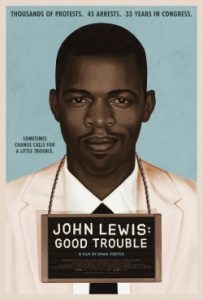 Using interviews and rare archival footage, JOHN LEWIS: GOOD TROUBLE chronicles John Lewis’s 60-plus years of social activism and legislative action on civil rights, voting rights, gun control, health-care reform, and immigration. Using present-day interviews with Lewis, now 80 years old, director Dawn Porter explores Lewis’s childhood experiences, his family, and meeting Dr. Martin Luther King Jr. in 1957. The film will also feature interviews with political leaders, Congressional colleagues, and other prominent figures in Lewis’s life.
Using interviews and rare archival footage, JOHN LEWIS: GOOD TROUBLE chronicles John Lewis’s 60-plus years of social activism and legislative action on civil rights, voting rights, gun control, health-care reform, and immigration. Using present-day interviews with Lewis, now 80 years old, director Dawn Porter explores Lewis’s childhood experiences, his family, and meeting Dr. Martin Luther King Jr. in 1957. The film will also feature interviews with political leaders, Congressional colleagues, and other prominent figures in Lewis’s life.
The film debuted in theaters and on demand Friday, July 3, 2020.
Each article included below is curated to make you think, question, and connect.
Opinion | How Racist was Flannery O’Connor? The New Yorker
Opinion | On Flannery O’Connor and Race: A Response to Paul Elie, The Bitter Southerner
With Books and New Focus, Mellon Foundation to Foster Social Equity | The New York Times
A Note of Gratitude and Change from Karen Paty | Georgia Council for the Arts
Georgia Governor Signs Hate Crimes Legislation into Law | The Atlanta Journal-Constitution
Justice by Design | Georgia State University News Hub
How Coronavirus is Threatening the Arts and Culture Ecosystem | Georgia Public Broadcasting
Talking About Race | National Museum of African American History and Culture
Check back each week for the latest edition of curated digital content, or subscribe to our newsletter below.

